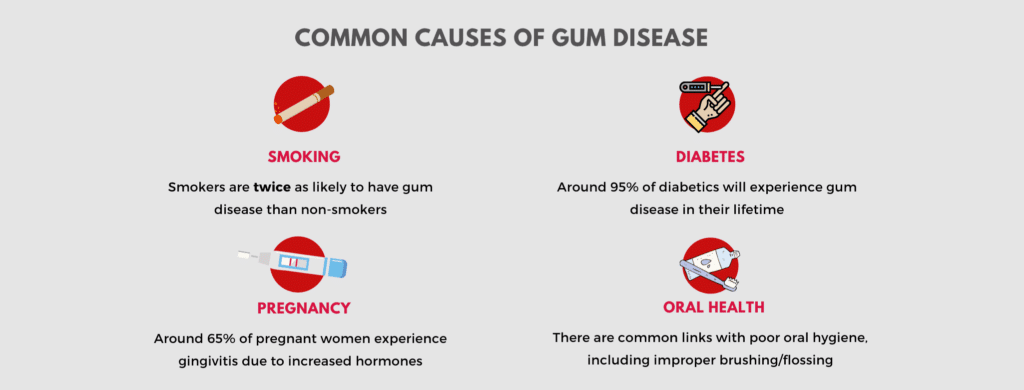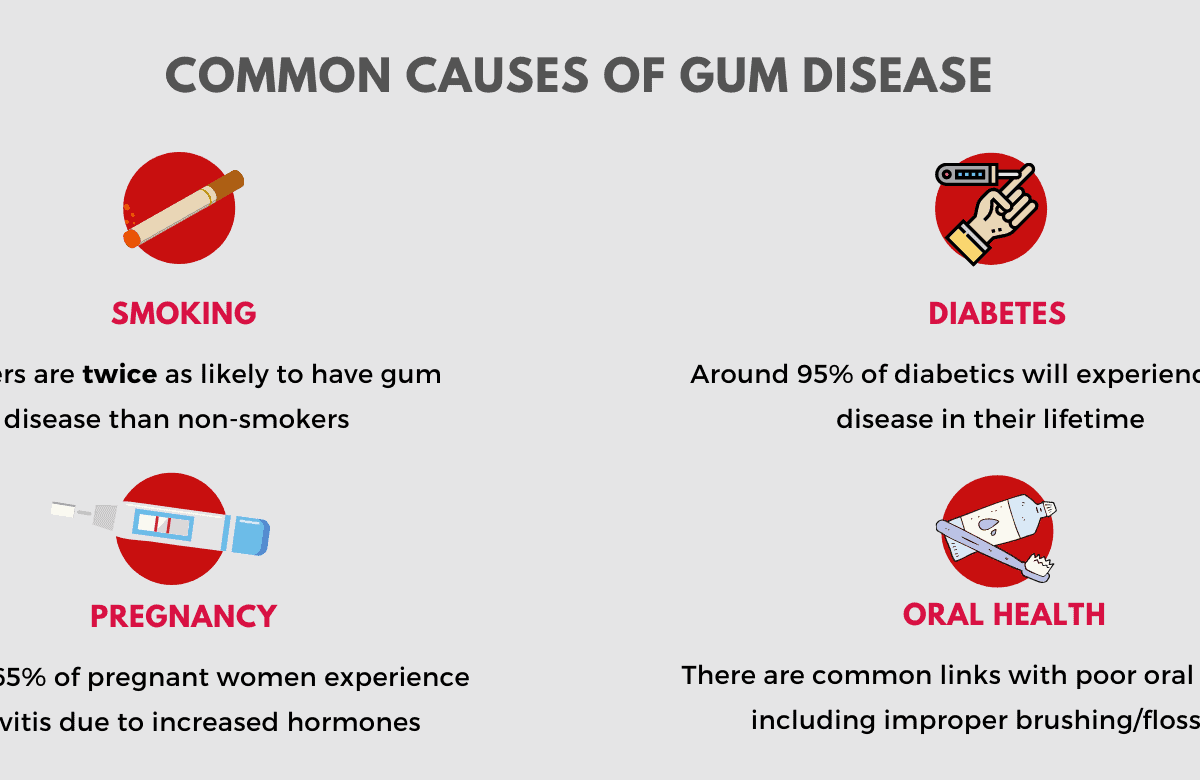Gum disease is a very common condition which is experienced by most UK adults at least once in their lifetime. With the condition of your gums and teeth affecting your overall health, gum disease is linked to many other health problems in other parts of the body, which is why it’s important to know the signs and underlying causes.
Although, unfortunately, millions of people around the world are unaware that they are suffering from gum disease as the symptoms can often be equivocal, with bleeding gums usually a sign of brushing too hard. As gum disease is also a completely painless infection, it can be difficult to spot the signs.
With the tissues surrounding and supporting your teeth prone to gum disease, it can result in infections leading to tooth loss in adults, which is why gum disease should be treated quickly and professionally and you must visit your dentist if your gums are swollen, bleeding or are painful.
In this guide, we explain what gum disease is, the symptoms and signs, if gum disease can be treated and whether long-term damages caused by gum disease can be reversed.
What Is Gum Disease?
Gum disease is caused by a buildup of plaque on your teeth, which is left behind on your teeth if you do not brush your teeth regularly and properly. Gum disease is typically caused by bad oral hygiene, however, it can be very common for those who are pregnant, diabetic or who regularly smoke.

Unfortunately, gum disease has strong links with a range of other health problems, including diabetes, heart disease, heart attacks, strokes and rheumatoid arthritis, so if you do believe you may have gum disease, it’s important to get it checked out by a trusted dentist.
Early stages of gum disease is known as gingivitis, which, when left untreated, can develop into a more serious condition called periodontitis. This can affect the tissues supporting your teeth. When periodontitis is left untreated, you may experience small gaps opening up between the gum and teeth, which can result in your teeth becoming loose.
In order to prevent gum disease, you should brush your teeth twice a day and regularly floss around and between each tooth. It can also help to visit a dental hygienist to thoroughly clean your teeth and ensure that your teeth are well looked after.
The Symptoms of Gum Disease
Gum disease isn’t always painful, so you may be unaware if you have it. As gum disease is often silent, some symptoms may not appear until the gum disease is advanced (gingivitis). With that being said, there are symptoms you should know and look out for.
- Pain or tenderness in the gums or teeth
- Gaps between the gums and teeth, which appear as gums beginning to come away from the tooth or gums receding. This can create pockets where additional bacteria builds up
- Bleeding from the gums when you brush or floss between the teeth
- Loose or wobbly teeth
- Persistent bad breath (halitosis) or an unpleasant taste in the mouth
- Swollen gums that are red or purple in colour, when they should be firm and pink
More advanced stages of gum disease (for example, periodontitis) can show the following symptoms:
- Pus that develops under the gums or teeth
- Movements of the teeth or a change in the way your teeth fit together or the way partial dentures fit
- Loose or separating teeth
- Mouth sores
- Bleeding after brushing or flossing
- Swollen and red gums
- Persistent bad breath
- Receding gums or gums pulling away from the teeth
Can Gum Disease Be Treated?
If you’re wondering how to get rid of gum disease, you should first visit your London dentist for a check-up. While there are products out there that can aim to treat gum disease, you must still visit your dentist as you may have advanced gum disease and could require further treatment, and your dentist can also create you a tailored treatment plan based on your infection.
The good news is that mild cases of gum disease can be treated with an improved level of oral hygiene, including brushing twice a day and regularly flossing, although, you should still visit your dentist, who can carry out a thorough dental examination to check the condition of your gums and can provide you with a professional cleaning to remove any hardened plaque.
For more severe cases of gum disease, you will usually need to have further dental treatment, so it’s best to not delay visiting your dental clinic.
Many of our customers ask us “can gum disease be reversed?”, the great news is yes, however, more extreme cases may require surgical treatment. It’s worth understanding that, when advanced, gum disease can cause further damage to other parts of the body.
Visit Your Dentist
Whether you’re suffering from gum disease or are experiencing some of the symptoms and are unsure of whether it is gum disease, you should visit your dentist.
We provide free online dental e-consultations and with our excellence and knowledge, we are able to provide professional dental treatment for gum disease, gingivitis, periodontitis, while creating you a treatment plan that is tailored to you. Our professional dental hygienists even provide dental cleaning to remove any hardened plaque (tartar).
Hermes Dental Clinic London is an award-winning dental clinic with experience and a proven track record in professional teeth whitening, as well as many other dental procedures. If you want more reasons to smile, then simply get in contact today – we’d love to help.
- GERD and Your Teeth: Why you should see a dentist urgently - November 24, 2024
- When a broken tooth is considered a dental emergency - November 24, 2024
- How to prevent tooth decay in children - July 9, 2024



